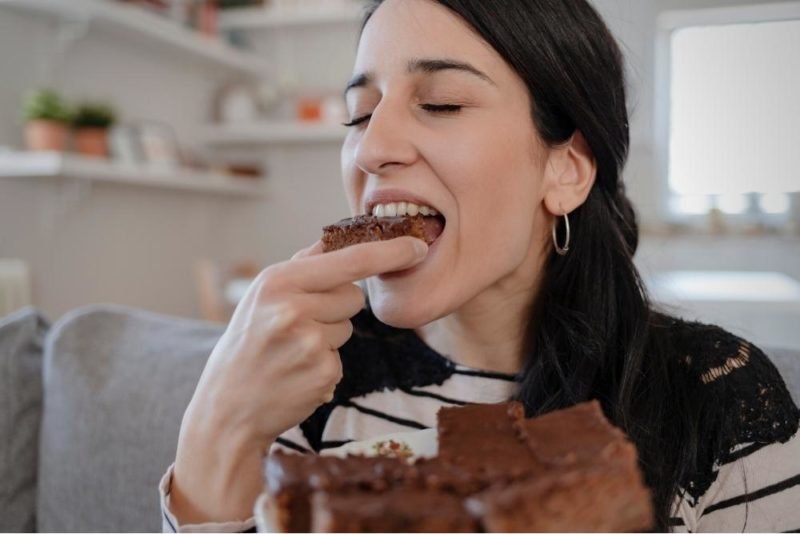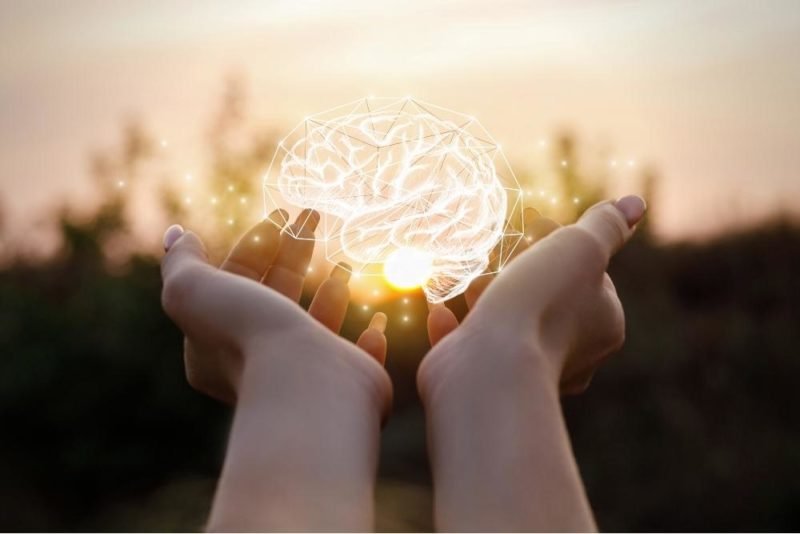
In our modern food environment, most of us are blessed to have ready access to a variety of foods. But what’s tricky is that we are also exposed to a lot of visual food cues, including:
- Advertisements
- Open-concept kitchens
- Coworkers bringing in cookies or doughnuts
- Chips and candy near the register even at stores that don’t primarily sell food
This kind of environment makes it more challenging to simply eat when we notice we’re hungry. Instead, we may want to eat just because we lay eyes on a food that looks tasty. Over time, visual food cues might lead us to eat when we’re not hungry more than we would if those cues weren’t present. (Note: this is less likely to happen for people who never had their inner intuitive eater knocked out of them, or who have reclaimed and practiced intuitive eating skills). We’re eating because we are seeking a reward, and that reward isn’t (or isn’t only) the satisfying of hunger.
Why does this happen? Let’s investigate.

Evolution and your brain
Some behaviors that don’t make practical sense today (and might even cause us distress) made a lot of sense to our long-ago ancestors. If you were an early hunter-gatherer, remembering how to access good sources of food (which watering hole the wooly mammoths prefer, where to find the berries that aren’t poisonous…and when they’re in season) would help make it possible for you to survive so you could take part in perpetuating the species.
Remembering this important food information requires either positive or negative reinforcement (or both).
- With positive reinforcement, you receive a reward for taking a certain action.
- With negative reinforcement, you reduce something negative by taking a certain action.
Both types of reinforcement increase the odds that you will take that action again in the future, because when our brains make the connection between an action (or behavior) and a reward, it creates a powerful emotional memory.
Said another way, if you eat a delicious food, and it makes you feel good (positive reinforcement), you embed a memory that helps you later recall where you got the food, what you liked about it, the circumstance in which we ate it, etc.
Similarly, if you are stressed or sad or anxious, and you eat something that helps you feel less bad (negative reinforcement), you might embed a memory that eating certain foods reduces certain uncomfortable emotions.
I see the effects of this “brain training” for food rewards play out in different ways, most notably “food addiction” and dieting.

The “rewards” of dieting
Let’s say you are counting calories, carbs or fat grams—or otherwise “watching what you eat” or “controlling portion sizes”—and you do lose weight (as most people do for the short term). If you get compliments about your shrinking body, that serves as positive reinforcement to keep doing what you’re doing. That can help compensate for the soul-sucking nature of eating “good” foods that you don’t really like and giving up “bad” foods that you love.
Chasing the rewards of compliments, praise and approval keeps people chasing weight loss, which perpetuates yo-yo dieting.
(There is another side to this coin, however. I’ve had clients who were in a phase of their life where they were more active than usual and eating “normally,” and lost some weight as a side effect. Then the compliments started coming, which made them uncomfortable—not everybody wants their body to be commented on, even in a “positive” way—which triggered them to start binge eating and/or being less active so they could stay indoors and hide their body. When they gained weight and the body complements stopped, this served as a negative reinforcement to stay on this path.)
Let’s not forget that restrained eating (food restriction) often leads to rebound eating. This rebound eating may feel like emotional eating, “out-of-control” eating, or binging. In some cases, it may actually meet the clinical definition of a binge, and of binge eating disorder (BED).
The perpetuation of this rebound eating in response to actual or even perceived restriction (scarcity), is driven by food tasting so much more rewarding after we’ve been deprived of it. On that note…

Fueling “food addiction”
On the “food addiction” front, I’ve had clients who had very strong emotional eating tendencies. Sometimes this started in childhood (when they were too young to have developed other means of coping). Sometimes this started in adulthood (during very stressful, very busy times of life when taking time for meaningful self-care was a pipe dream).
Do you think that using food to feel loved and cared for (positive reinforcement) or to numb out (negative reinforcement) creates powerful emotional memories? Yes it does.
It’s this reinforcement, and these emotional memories, that keep neglected children locked in an emotional eating cycle decades later even if they now have a loving partner, good friends and a fulfilling life. It’s what makes a medical or mental health professional (who you might think would “know better”) realize that they have no coping tools other than food because food always worked so well for them that they never bothered to diversify their coping toolbox.
There is some evidence that so-called “highly palatable” foods (processed foods high in added sugar, salt and fat) can have an even more rewarding effect. It can get to the point where we so strongly anticipate that reward when we eat those foods that it’s very hard to resist visual cues associated with those foods. For example, a picture of someone eating ice cream, a pizza ad on TV, donuts (even stale donuts) in the break room.
So is this food addiction, or is it brain training?

Retraining the brain
Regardless of what you call it, eating that feels emotional or out of control in some way might feel good in the moment, but then not so good later.
- You might feel guilt or shame (which you honestly don’t deserve)
- You might have eaten to the point of physical discomfort
- You might fear weight gain (even though your eating might not actually be causing weight gain and stopping emotional/binge eating might not lead to weight loss)
Which of these tools is best for retraining your brain regarding food rewards?
- Willpower
- Mindfulness
- A lobotomy
Oh, I hope you said B! Willpower is real, but it’s not an infinite resource, and we use it up as we make decisions and deal with stressors throughout the day. (When you want to say something snarky to a co-worker or honk at a rude driver, and you don’t, you just used up some willpower.) And I’m not even going to comment on the idea of a lobotomy.
Using mindfulness in this context involves:
- Becoming aware of our behaviors and what triggers them
- Exploring and recognizing the actual rewards (physical sensations and emotional effects) we get from the behavior—without judgement (!)
- Using that information to make a compassionate choice that supports self-care
While having a general mindfulness meditation practice can help with this, a short, informal, in-the-moment practice, such as this version of the RAIN meditation, may be more helpful:
- Recognize the craving/eating impulse
- Allow the experience to exist, just as it is
- Investigate with interest and care what it feels like in the body
- Note the related physical sensations from moment to moment, with self-compassion
If you would like to learn more about RAIN, Tara Brach discusses it nicely on her website.

The bottom line
It’s easy to get stuck in habitual behavior patterns that we didn’t consciously choose and may also be repeating endlessly without making a conscious choice to do so. These patterns aren’t limited to food…we may find ourselves repeating certain patterns in our relationships, our shopping habits, and other aspects of life.
When we can shine a self-compassionate light on what we’re doing and why we’re doing it, it opens the door to making a conscious choice, whether that choice is in alignment with our established habit, or something totally different. The fact that we now have a choice (no more autopilot) is a win.
Disclaimer: All information provided here is of a general nature and is furnished only for educational purposes. This information is not to be taken as medical or other health advice pertaining to an individual’s specific health or medical condition. You agree that the use of this information is at your own risk.
Hi, I’m Carrie Dennett, MPH, RDN, a weight-inclusive registered dietitian, nutrition therapist and body image counselor. I offer compassionate, individualized care for adults of all ages, shapes, sizes and genders who want to break free from eating disorders, disordered eating or chronic dieting. If you need to learn how to manage IBS symptoms with food, or improve your nutrition and lifestyle habits to help manage a current health concern or simply support your overall health and well-being, I help people with that, too.
Need 1-on-1 help for your nutrition, eating, or body image concerns? Schedule a free 20-minute Discovery Call to talk about how I can help you and explore if we’re a good fit! I’m in-network with Regence BCBS, FirstChoice Health and Providence Health Plan, and can bill Blue Cross and/or Blue Shield insurances in many states. If I don’t take your insurance, I can help you seek reimbursement on your own. To learn more, explore my insurance and services areas page.
 Print This Post
Print This Post






